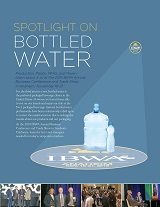A new book, “Bottlemania,” used the bottled water industry as a launch-point for what could have been an instructive view on the importance of drinking water and environmental protection and sustainability. Rather, the book presents a misinformed, slanted view of the bottled water industry that will only confuse consumers who choose the healthy benefits of bottled water and misdirect what should be an all-encompassing, science-based approach to environmental policy.
The International Bottled Water Association (IBWA) stands ready to assist journalists prepare their bottled coverage. As the authoritative voice on all issues concerning the bottled water industry, IBWA is the leading resource for bottled water information and facts and can provide access to staff experts in a variety of areas, as well as independent third-party experts for interviews and expertise on water related topics, including:
- bottled water industry leadership in environmental stewardship including resource usage (e.g., ground water, recycling)
- hydration, health and nutrition;
- bottled water’s role as a consumer beverage-of-choice
- bottled water and drinking water regulatory, safety and quality issues.
Consider this…
- People recognize the importance of water consumption for hydration and refreshment and that should be encouraged. Many consumers likely drink both bottled water and tap water depending on the circumstances; it does not always amount to a tap water versus bottled water choice.
- Bottled water is growing in popularity because people appreciate its consistent quality, taste, and convenience and choose bottled water over the other beverages because it does not contain calories, caffeine, sugar, artificial flavors or colors, alcohol and other ingredients.
- The bottled water industry supports improvements to our nation’s water infrastructure. The fact is that bottled water companies that utilize municipal water systems are rate-payers; their production and sales have no relationship to water infrastructure challenges. And, just as local governments invest in providing safe municipal drinking water, bottled water companies invest many millions of dollars in developing water sources, production plants, packaging, and safety and quality measures. Yet, bottled water is available at a variety of price points, with an average per-gallon cost of $1.64, according to A.C. Nielsen.
- The bottled water industry is a leader in the food and beverage industry in reducing its environmental footprint while, at the same time, delivering the healthful value of bottled water. All bottled water containers are recyclable packaging and use lighter-weight materials than other beverages.
- The bottled water industry is working with other beverage and food producers, municipalities, and recycling advocacy groups to continually increase recycling. Further, the bottled water industry is considered one of the original recyclers as the larger containers used on bottled water coolers may be used repeatedly and recycled at the end of their useful service.
- Solely focusing on bottled water is not the right approach to implement effective environmental policies; broad ranging, comprehensive solutions that cover all consumer goods are.
- Annual bottled water production accounts for less than 2/100 of a percent (0.02%) of the total ground water withdrawn in the United States each year. The bottled water industry uses minimal amounts of groundwater to produce this important consumer product-and does so with great efficiency. Visit the web site of the Drinking Water Research Foundation (www.dwrf.info) for a study summary of the report, “Bottled Water Production in the United States: How Much Ground Water is Actually Being Used?”
- Even though it is a minimal groundwater user and is one of among thousands of food, beverage and commercial water users, bottled water companies actively support comprehensive ground water management practices that are science-based, treat all users equitably, multi-jurisdictional, and provide for future needs of this important resource.
- Bottled water is comprehensively regulated as a packaged food product by the U.S. Food and Drug Administration (FDA), which mandates stringent standards to help ensure bottled water’s consistent safety, quality and good taste. By law, FDA bottled water standards must be at least as stringent and protective of public health as U.S. Environmental Protection Agency (EPA) standards for municipal drinking water systems.
- All plastics (and other materials) intended for contact with foods or beverages, including bottled water, are regulated by FDA to help assure their safety. The materials used in all bottled water containers are shown to be safe through extensive laboratory testing.
- FDA comprehensively regulates the safety of food, including bottled water, by carefully reviewing food and beverage packaging materials before allowing them on the market. As part of its review, FDA assesses the migration potential of plastics and the substances with which they are made.
- FDA allows food-contact plastics for their intended use based on safety data. The process includes stringent requirements for estimating the levels at which such materials may transfer to the diet. FDA’s safety criteria require extensive toxicity testing for any substance that may be ingested at more than negligible levels. This means FDA has affirmatively determined that, when plastics are used as intended in food-contact applications, the nature and amount of substances that may migrate, if any, are safe.
- Bottled water companies respond with efficiency and speed with regard to provide bottled water in coordination with emergency relief operations. The bottled water industry provides millions of bottled water servings in response to natural and man-made disasters each year.
- More than 60 percent of the International Bottled Water Association’s membership is made up of small businesses with annual sales of less than $1 million and a few employees. The overwhelming majority have sales of less than $10 million.



























